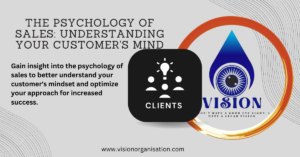The Psychology of Sales: Understanding Your Customer’s Mind – Introduction –
In the ever-competitive world of sales, understanding your customer’s mind goes beyond demographics and purchase history. We embark on a captivating journey into the world of consumer psychology, where we’ll unlock the secrets of how customers tick. By unlocking the secrets of how customers think, feel, and make decisions, you can craft a sales strategy that resonates, builds trust, and ultimately drives conversions.
Why Understanding Customer Psychology Matters in Sales
Consumer psychology is the foundation for effective sales communication. Here’s why:
Emotional Decision-Making: Despite our best efforts to be rational, emotions often play a significant role in our purchasing decisions. Understanding these emotions allows you to tailor your approach and connect with customers on a deeper level.
Building Trust and Rapport: Customers are more likely to do business with someone they trust and feel a connection with. Psychology helps you identify buying triggers, build rapport, and foster trust throughout the sales process.
Overcoming Objections: Objections are a natural part of the sales cycle. By understanding the psychology behind objections, you can address them effectively and confidently, guiding the customer towards a positive outcome.
Crafting Persuasive Communication: The language you use and the way you present your product or service can significantly impact customer perception. Understanding the psychology of persuasion empowers you to craft compelling messages that resonate with your audience.
Key Psychological Principles to Apply in Sales
Now that we understand the significance of customer psychology, let’s explore some key principles you can integrate into your sales strategy:
The Power of Storytelling: Weaving stories into your sales pitch can be incredibly effective. Stories tap into emotions, make information memorable, and help customers connect with your product or service on a personal level. Understanding Your Customer’s Mind.
The Reciprocity Principle: People feel obligated to return favors. By offering valuable insights, resources, or even a listening ear, you can create a sense of obligation that can lead to a sale.
Social Proof and Authority: People are influenced by the opinions and actions of others. Highlighting positive customer testimonials, social proof, and industry recognition can build trust and credibility for your product or service.
Scarcity and Urgency: Limited-time offers or limited-availability products can create a sense of urgency and scarcity, encouraging customers to act before they miss out. Understanding Your Customer’s Mind.
The Framing Effect: How you present information can significantly impact customer perception. Focus on highlighting the benefits your product or service offers, rather than dwelling on potential drawbacks.
Loss Aversion: People tend to be more motivated to avoid losses than acquire gains. Frame your sales pitch around the potential negative consequences of not using your product or service to nudge customers towards a purchase decision. Understanding Your Customer’s Mind.
Putting Psychology into Practice: From Theory to Action
Active Listening: Pay close attention to customer concerns, needs, and desires. This active listening allows you to tailor your approach and address their specific pain points. Understanding Your Customer’s Mind.
Mirroring and Matching: Subtly mirroring a customer’s body language and communication style can build rapport and create a sense of connection.
Focus on Benefits, not Features: Don’t just list features; explain how those features translate into tangible benefits that solve the customer’s problems and improve their lives.
Use Powerful Language: Emphasize words that evoke positive emotions and create a sense of urgency or exclusivity.
Embrace the Power of Empathy: Put yourself in the customer’s shoes and understand their perspective. This empathy allows you to build trust and offer solutions that genuinely address their needs. Understanding Your Customer’s Mind.

Conclusion: The Human Connection – The Key to Sales Success
While the science of psychology offers valuable insights, remember that sales are ultimately about human connection. By understanding your customer’s mind and leveraging these psychological principles, you can build trust, address concerns, and guide them towards a purchase decision that benefits both them and your business. In the ever-evolving world of sales, mastering the psychology of your customer remains the cornerstone of sustainable sales success.

